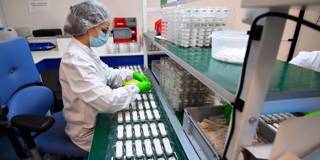With the launch of a fund to support new treatments against novel and resistant pathogens, the pharmaceutical industry has acknowledged that there is a looming antimicrobial resistance crisis. But without better incentives, especially for smaller firms, additional up-front funding won't solve the problem.
LONDON – Earlier this month, the International Federation of Pharmaceutical Manufacturers & Associations (IFPMA) launched a nearly $1 billion AMR (antimicrobial resistance) Action Fund to support the development of desperately needed new antibiotics. Many of the world’s largest pharmaceutical companies, as well as the Wellcome Trust and the European Investment Bank, have signed on to the initiative, which was announced via a globally coordinated presentation broadcast simultaneously from Europe and the United States.
The IFPMA’s members and representatives are voicing their concern about the deepening scarcity of effective antibiotics in the face of resistant and novel pathogens. In a Financial Times commentary to promote the new fund, Emma Walmsley, the CEO of GlaxoSmithKline, cites findings from the United Kingdom’s 2014-16 Review on Antimicrobial Resistance, which I chaired. As we warned then, if the problem isn’t addressed, the AMR death toll by 2050 could reach ten million per year, resulting in cumulative economic losses of $100 trillion.
Given the scale of the AMR crisis, the IFPMA’s latest move is certainly welcome. But whether it represents a turning point remains to be seen. In the AMR Review, we pointed out that more funding is needed at all stages of the antimicrobial development pipeline. For example, at the earliest stage, there clearly needed to be stronger “push” incentives to stimulate research and innovation. But there also need to be “pull” incentives (rewards for outcomes), such as market-entry inducements or volume guarantees to bring new treatments from start to finish.

LONDON – Earlier this month, the International Federation of Pharmaceutical Manufacturers & Associations (IFPMA) launched a nearly $1 billion AMR (antimicrobial resistance) Action Fund to support the development of desperately needed new antibiotics. Many of the world’s largest pharmaceutical companies, as well as the Wellcome Trust and the European Investment Bank, have signed on to the initiative, which was announced via a globally coordinated presentation broadcast simultaneously from Europe and the United States.
The IFPMA’s members and representatives are voicing their concern about the deepening scarcity of effective antibiotics in the face of resistant and novel pathogens. In a Financial Times commentary to promote the new fund, Emma Walmsley, the CEO of GlaxoSmithKline, cites findings from the United Kingdom’s 2014-16 Review on Antimicrobial Resistance, which I chaired. As we warned then, if the problem isn’t addressed, the AMR death toll by 2050 could reach ten million per year, resulting in cumulative economic losses of $100 trillion.
Given the scale of the AMR crisis, the IFPMA’s latest move is certainly welcome. But whether it represents a turning point remains to be seen. In the AMR Review, we pointed out that more funding is needed at all stages of the antimicrobial development pipeline. For example, at the earliest stage, there clearly needed to be stronger “push” incentives to stimulate research and innovation. But there also need to be “pull” incentives (rewards for outcomes), such as market-entry inducements or volume guarantees to bring new treatments from start to finish.